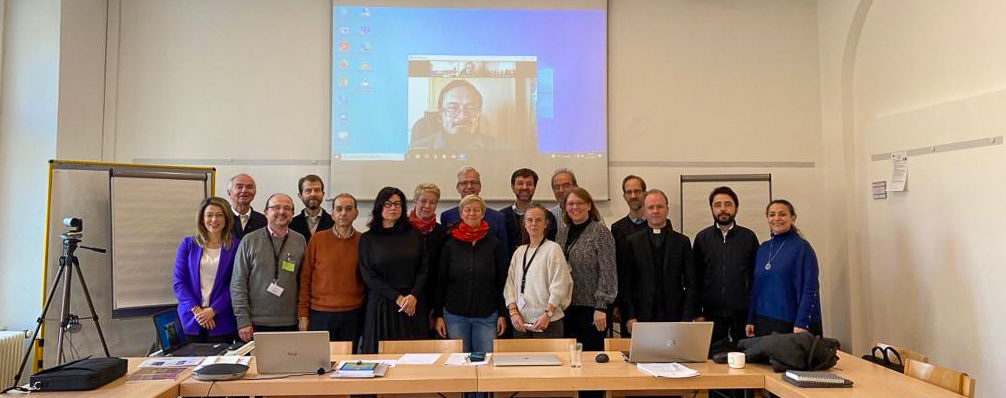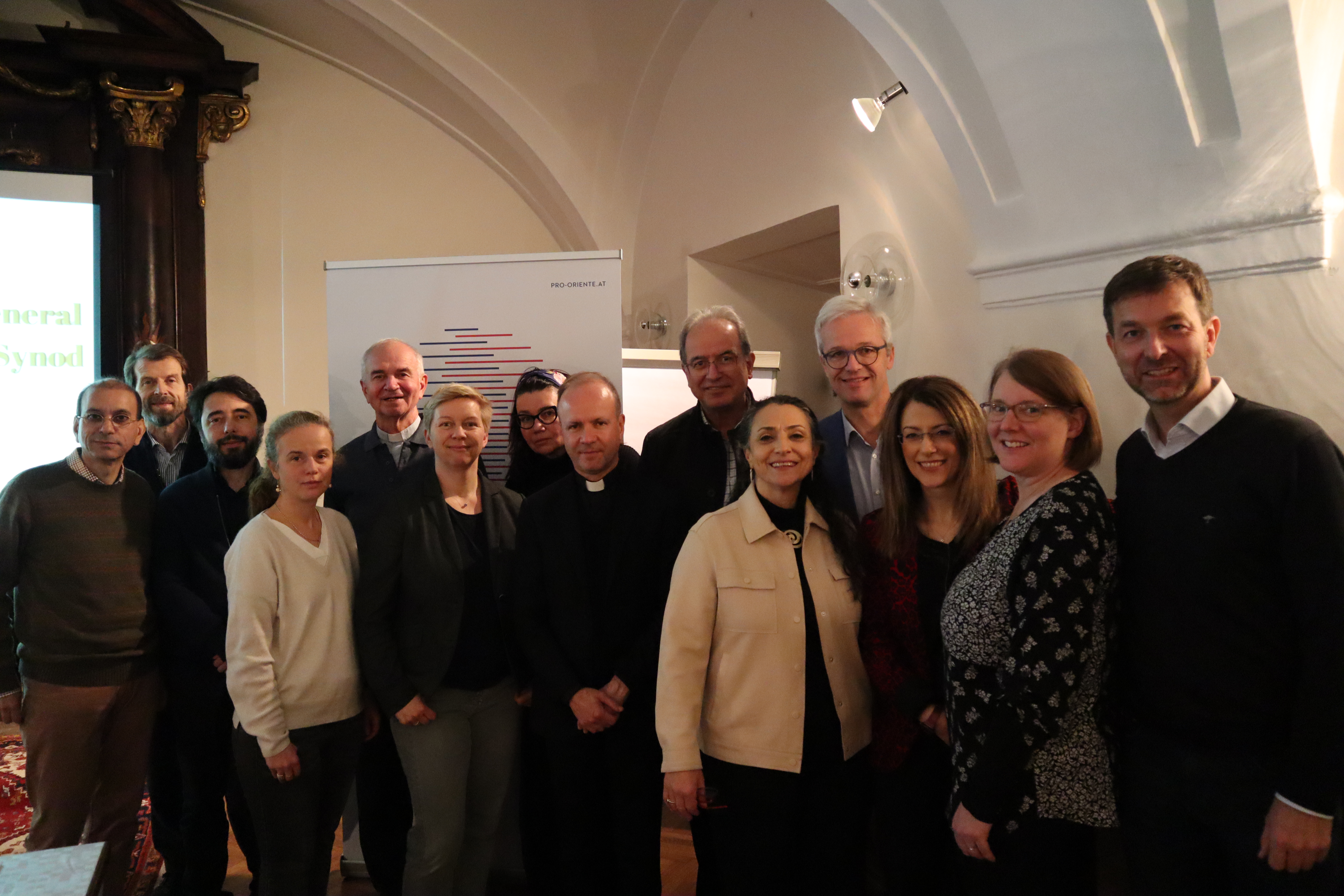Steering Committee for Orthodox-Catholic Dialogue (POSCOCD)
The PRO ORIENTE Steering Committee for Orthodox-Catholic Dialogue was established by PRO ORIENTE in 2018 to reflect and coordinate the foundation's activities in the field of dialogue with the Orthodox Church. The committee comprises eight Orthodox and eight Catholic theologians from different European countries:
Orthodox members |
Catholic members |
Kateřina Kočandrle BAUER, Prague |
Hyacinthe DESTIVELLE OP, Rome |
Pantelis KALAITZIDIS, Volos |
Regina ELSNER, Berlin |
Assaad Elias KATTAN, Muenster |
Thomas Mark NÉMETH, Vienna |
Vladimir KHULAP, Saint Petersburg |
Johannes OELDEMANN, Paderborn |
Ioan MOGA, Vienna |
Rudolf PROKSCHI, Vienna |
Katerina PEKRIDOU, Bruxelles |
Catherine SHIRK LUCAS, Paris |
Julija NAETT VIDOVIĆ, Paris |
Myriam WIJLENS, Erfurt |
Georgios VLANTIS, Munich |
Milan ŽUST SJ, Rome |

PRO ORIENTE Steering Committee for Orthodox-Catholic Dialogue (2021) | PRO ORIENTE

Members of POSCOCD (2023) | PRO ORIENTE
The dialogue between Catholics and Orthodox has become a reality in church life in recent decades. Encouraged by the example of prominent figures, like Patriarch Athenagoras and Pope John XXIII, many Orthodox and Catholic hierarchs and theologians have sought to open doors for mutual encounter and understanding.
Theological dialogues between Catholics and Orthodox began on different levels – official and unofficial, national as well as international. While in the first decades the participants strived towards a better understanding between Christians who have become “foreign brothers and sisters” due to the estrangement of churches in East and West over the centuries, in recent times, the Orthodox-Catholic dialogue increasingly focuses on common challenges for both Catholics and Orthodox in a progressively coalescent and interconnected world. Due to migration and easier ways to travel, as neighbours and “relatives” in a pluralistic society, which has been a reality in the western world for many years and becomes apparent currently in traditional Orthodox countries as well, Catholics and Orthodox no longer live in different worlds today.
The interconfessional dialogue between the Orthodox and Catholic Churches has yielded encouraging results over the past decades. Several theological disagreements have been overcome, the language of hatred has been largely replaced with a language of openness and mutual interest, and many faithful already share a common commitment to justice, peace, and the integrity of creation.
The PRO ORIENTE Steering Committee for Orthodox-Catholic Dialogue has currently formed three working groups that have developed the following projects to strengthen and intensify Orthodox-Catholic dialogue.:
- “Connecting Dialogues”
- “Healing of wounded Memories”
- “Reception and Inspiration”
Connecting Dialogues
Dialogue between Catholics and Orthodox has become a reality in church life in recent decades. Encouraged by the example of prominent figures, like Patriarch Athenagoras and Pope John XXIII, many Orthodox and Catholic hierarchs and theologians have sought to open doors for mutual encounter and understanding.
Theological dialogues between Catholics and Orthodox began on different levels – official and unofficial, national as well as international. While in the first decades the participants strived towards a better understanding between Christians who have become “foreign brothers and sisters” due to the estrangement of churches in East and West over the centuries, in recent times the Orthodox-Catholic dialogue increasingly focuses on common challenges for both Catholics and Orthodox in an progressively coalescent and interconnected world. Due to migration and easier ways to travel, as neighbours and “relatives” in a pluralistic society, which has been a reality in the western world for many years and becomes apparent currently in traditional Orthodox countries as well, Catholics and Orthodox no longer live in different worlds today.
Against this background the PRO ORIENTE Steering Committee for Orthodox-Catholic Dialogue aims to stimulate dialogue between Catholics and Orthodox by providing a platform where people who are engaged or interested in Orthodox-Catholic Dialogue will find resources for interchange about important topics and common themes.
The online platform aims at:
- providing online access to all relevant resources for Orthodox-Catholic Dialogue;
- connecting different commissions and levels of dialogue to foster exchange between them;
- facilitating reception of the results of the dialogues in theological education and Church life;
- encouraging young people to establish a new relationship between Orthodox and Catholics.
Following our motto “Connecting Dialogues”, the online database provides common declarations, documents and texts published on different levels since the 1960s when theological dialogues between representatives of the Roman Catholic and Orthodox churches began.
The database includes:
- All documents of the International Commission for Theological Dialogue between the Roman Catholic Church and the Orthodox Church;
- Documents and documentary material of meetings between Popes and Primates of Orthodox Churches;
- Results of theological dialogues between the Roman Catholic Church and single autocephalous Orthodox Churches;
- Common statements and texts of theological dialogues on national or regional levels;
- Common studies of unofficial groups for theological dialogue;
- Catholic and Orthodox documents which are relevant for theological dialogue between Catholics and Orthodox.
The database includes the texts, if available, in four Western languages (English, French, German, Italian) and four Eastern languages (Greek, Romanian, Russian, Serbian). The POSCOCD members attempted to gather as many documents as possible.
Members
- Hyacinthe DESTIVELLE OP
- Vladimir KHULAP
- Ioan MOGA
- Johannes OELDEMANN
- Katerina PEKRIDOU
Healing of Wounded Memories
Dialogue between the Orthodox and Catholic Churches has yielded encouraging results over the past decades. Several theological disagreements have been overcome, the language of hatred has been largely replaced with a language of openness and mutual interest, and many faithful already share a common commitment to justice, peace and the integrity of creation.
Nevertheless, in several parts of the world the reception of these results on the part of the local churches and communities has been and continues to be hampered by the legacy of historical conflicts, war and discrimination. For wounded memories encumber individuals, groups, parishes and churches, prevent the implementation of the fruits of decades of official and unofficial dialogues, and, even more tragically, paralyze mutual trust and impede the growth of sustainable peace.
The project Healing of Wounded Memories aims to open up new spaces for ecumenical praxis, especially in terms of local reconciliation. Through theological exchange, with the aid of humanities and social sciences and on the ground of a long experience of dialogue, laity and clergy from different churches, nationalities and generations are invited to seek and find new perspectives on forgiveness, repentance and justice. This project is basically meant to facilitate a new encounter of Christian communities whose relationships have worsened due to hatred, discrimination and the memory of violence. The POSCOCD subgroup in charge of this project reaches out to theological expertise, interdisciplinary input and local actors interested and involved in processes of reconciliation in the context of post-conflict societies. We believe that repentance, forgiveness, justice and reconciliation are theological key concepts which need ecclesial awareness, academic reflection and personal commitment.
Members
- Regina ELSNER
- Pantelis KALAITZIDIS
- Assaad Elias KATTAN
- Thomas Mark NÉMETH
- Julija NAETT VIDOVIĆ
- Milan ŽUST
Reception and Inspiration
Orthodox-Catholic dialogue takes place in various levels of Church life. Its considerable fruits during the last decades encourage Christians of both traditions to continue together on the way towards full ecclesial unity.
A lot has already been achieved, but still much remains to be done. Reception and inspiration mark key concepts and challenges for Orthodox-Catholic ecumenism. Theological agreements enable progress towards unity when they are being properly received on the various levels of Church life. A thorough reflection on the ways, conditions, facilitators and contexts of reception is therefore central in ecumenical work. Therefore it also has to face the question of how to inspire and motivate clergymen, theologians and the faithful in general to actively share and shape the vision of Christian unity.
The POSCOCD is an expert network that addresses central ecumenical issues, developing, implementing and coordinating new ideas and projects in the different fields of Orthodox-Catholic encounter.
The subgroup in charge of Reception and inspiration elaborates ways of facilitating processes of reception of ecumenical fruits in the Churches. Furthermore, it wishes to contribute to a culture of reception of the Other and to the ecumenical ethos in general. It also studies new ways for inspiring the faithful of both traditions to engage in the ecumenical movement in general and to promote the mutual encounter of Orthodox and Catholics in particular.
The Reception and inspiration subgroup develops ideas in a variety of directions, scales and formats: academic theological work, pastoral programs, youth encounters and information materials, organization of seminars, etc. The subgroup emphasizes the importance of the connection between reception, inner conversion and formation of the people facilitating reception. This is not just a discussion on structures or providing information. A great challenge is to contribute to the formation of people so that their inner attitude enables them to behave and work in a way that promotes reception and inspires others for ecumenism.
Members
- Kateřina KOČANDRLE BAUER
- Catherine SHIRK LUCAS
- Georgios VLANTIS
- Myriam WIJLENS



